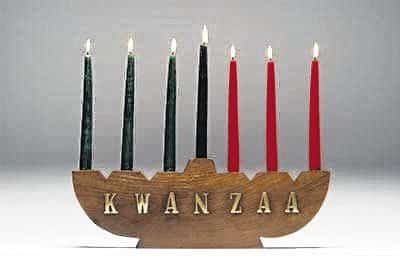The candles of Kwanzaa literally shed light on African history and culture.
And Kiya Coulibaly will be among those bringing a focus to that come Monday amid a program and pitch-in meal at the Bartholomew County Public Library. Coulibaly, a native of Ivory Coast, will croon a tune from Nigerian-born gospel singer Sinach at the event beginning with a one-hour program at 5:30 p.m. in the Red Room.
“She sings with such a passion of the Holy Spirit,” Coulibaly said. “And she has such a powerful way of conveying the message of the love of Jesus Christ.”
The flaming lights will be part of the Menorah-inspired mishumaa saba, Swahili for seven candles, symbolizing Kwanzaa’s seven principles: unity, self-determination, collective work and responsibility, cooperative economics, purpose, creativity and faith.
[sc:text-divider text-divider-title=”Story continues below gallery” ]
The free event organized by the Columbus Bartholomew County Area NAACP Branch will include music, a history of the celebration, poetry readings, dance and more, Williams said.
Last year about 65 to 75 people of various races and background attended, according to organizers.
Kwanzaa is observed Dec. 26 through Jan. 1, often culminating in a feast. Local gatherings regularly have included people other than blacks, according to organizers, who regularly emphasize that all are always welcome. It was created by national civil rights activist Maulana Karenga and first celebrated in 1966. Each of the seven days of Kwanzaa is dedicated to one of the seven principles.
“Kwanzaa brings a cultural message which speaks to the best of what it means to be African and human in the fullest sense,” Karenga once said.
First fruits festivals exist in southern Africa, celebrated in December and January with the southern solstice, and Karenga was partly inspired by an account he read of the Zulu festival Umkhosi Wokweshwama, according to Keith Mayes’ 2009 book “Kwanzaa: Black Power and the Making of the African-American Holiday Tradition.” An extra “a” was added to the name to symbolically give the word seven letters, matching the seven principles.
Though the holiday is not Christian, a number of local participants such as Coulibaly and others have included elements of their faith in the gatherings.
“We like give it a varied flavor,” said Cabrina Williams, one of the organizers. “I see every part of history as important. Christians celebrate Christmas because of Jesus, or because of presents or because of family getting together. Kwanzaa includes all that except Jesus.”
In fact, the last day of Kwanzaa usually includes gift giving — often homemade items — as a means to honor the creative spirit and reaffirm self worth. Though Williams is outspoken about her Christian faith, she is equally passionate about Kwanzaa because her mother regularly required her to be a good student of history with a broad view.
“I love all people so much, no matter what they believe,” Williams said.
With food sharing, Williams likes to bring a favorite dish from her Cajun background: red beans and rice. Coulibaly mentioned that she hopes to bring an African dish of some sort in keeping with the overall focus after enjoying her first local Kwanzaa last year.
“It was really fun,” Coulibaly said. “And it was something different.”
[sc:pullout-title pullout-title=”The celebration” ][sc:pullout-text-begin]
What: Annual Kwanzaa celebration of African heritage and African-American culture.
When: 5:30 to 8:30 p.m. Monday. One-hour program of entertainment and history opens the event, followed by a pitch-in meal. Organizers ask attendees to bring a dish to share.
Where: Red Room of the Bartholomew County Public Library, 536 Fifth St. in downtown Columbus.
Information: Facebook page for Kwanzaa Celebration
[sc:pullout-text-end]





